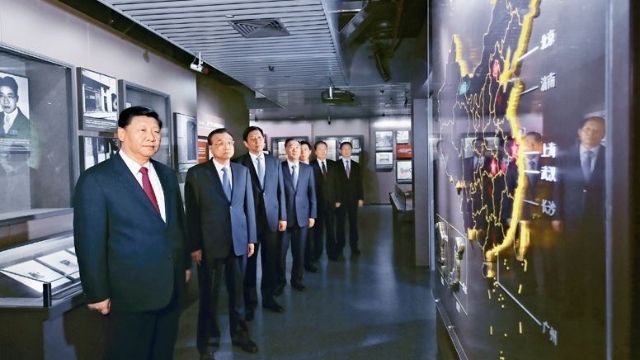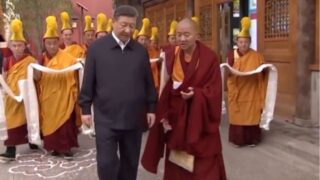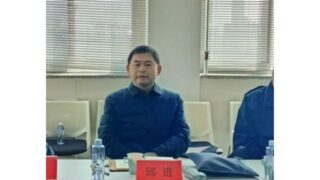All Chinese are mobilized. But “history,” Xi explains, in a Marxist context, has not the same meaning it has in a bourgeois academia.
by Massimo Introvigne


Chinese media in these weeks are dominated by “Party History Study,” which is required homework for all Chinese in the year 2021, which marks the 100th anniversary of the foundation of the Chinese Communist Party. The whole country is mobilized to learn the history of the CCP. Not only in schools, but in offices, factories, and pretty much everywhere there will be exams testing the proficiency citizens have achieved in learning CCP’s history.
The March 31/April 1 issue of Qiushi, the official ideological magazine of the CCP, has published the full text of a speech Xi Jinping delivered at a “Mobilization Conference on Party History Study and Education,” held on February 20, 2021.
“Party history is the most vivid, the most persuasive textbook,” Xi said. This may sound very poetic, but it is important to understand what he means with “history.”
Marxist history, Xi explained, should not be confused with bourgeois history. “We must persist in using historical materialism” when presenting history. As “the largest Marxist party in the world,” when the CCP deals with history, it should do it in a Marxist way. “History has created the CCP,” Xi said, and it is now time for the CCP to create its own history.
“During its 100-year struggle, our Party has always analyzed and grasped the general historical trend with the basic principles of Marxism,” and it should continue to do so, Xi insisted.
What is historical materialism? It is Marx’s grand theory of history, interpreting everything through the lenses of relations of production and class struggle. It is ideological history, in the sense that first, the ideology is presented as absolutely true, then facts are ordered and made to fit the Procrustean bed of the ideological scheme. It is also teleological history, since there is no uncertainty, and we know exactly what the denouement will be. Communism will win, and capitalism will lose.
Xi Jinping reminded the Chinese that Marx’s scheme should be rigidly followed. The Party History Study campaign is not about some bourgeois investigation of documents and archives, as a western academic historian would do. Its aim is to “comprehend the power of ideology and increase the political consciousness” of the Chinese. “Marxism, Xi said, is a powerful ideological weapon for us to understand the world, grasp the laws, pursue the truth, and transform the world. It is the guiding ideology that our party and country must always follow.” Making and studying history “cannot be for a moment without theoretical thinking, or without ideological guidance.” The campaign should be guided by party executives, who will be above the academics.
Also, Marx has already revealed the direction of world history. It is not something historians can further discuss or argue about. “The law and general trend of historical development” have already been established. Xi assured us that “Marx and Engels scientifically revealed the historical law that socialism will inevitably replace capitalism.”
Adhering to this perspective is not a question of seeking empirical evidence. Bourgeois history leads to “historical nihilism.” It is, first, a question of obedience, as Xi makes abundantly clear that those who would use a different historical methodology would be punished, and second, a question of faith. The use by Xi of religious terminology and metaphors is significant. He uses the word “miracle” several times, to celebrate how Marxism achieved its victory in China, of all countries and despite what Marx himself would have considered unfavorable historical conditions. This passage of his speech is among the most interesting: “Faith is of the utmost importance at all times. The belief in Communism […] is the political soul of the Communists, and the spiritual pillar for the Communists to withstand any test.” “Belief,” “faith,” “soul” and “spiritual” are all used in the same sentence.
In applying these principles to the birth of the Communist Party in 1921, Xi also offered a general scheme, which is known from his other writings and speeches. It insists on how China, once the greatest civilization in the world, was victimized, “enslaved,” and humiliated by the West. “The Taiping Heavenly Kingdom Movement, the Westernization Movement, the Reform Movement of 1898, the Boxer Movement, and the Revolution of 1911” were valuable, if unsuccessful, attempts to save the nation. Paradoxically, but not without precedents in CCP historiography, the Taiping Heavenly Kingdom of the 19th century, a messianic new religious movement whose leader proclaimed himself the brother of Jesus Christ, launching the bloodiest civil war in human history, one that may have caused up to 70 million deaths, is regarded as a somewhat well-intentioned, if failed, social rebellion rather than the ultimate xie jiao or “cult.”
But, Xi said, the Taiping and the other reformist or revolutionary movements “all ended in failure and failed to change the tragic fate of the Chinese people and the Chinese nation.” Only “the blast of the October Revolution [in Russia] brought Marxism-Leninism to China. This was like a glow in the dark, pointing out the direction for the Chinese advanced elements who were struggling to find the way to save the country and the people, and the Chinese Communist Party came into being.”
Subsequent Party history should be studied by showing that the CCP’s successes came when it was guided with an iron hand. What Chinese should learn from Party history is that “maintaining the authority of the Party Central Committee and centralized and unified leadership must not remain in words, but must be reflected in actions.”
The campaign is also aimed at purging the field of history from “wrong tendencies” and the use of “illegal overseas publications” (meaning the works of western academics). “Historical materialism is the fundamental method for us Communists to understand and grasp history. If the concept of history is wrong, not only will it fail to achieve the goal of learning and education, but on the contrary, it will go the wrong way and go into a misunderstanding,” Xi explained. Adding that such “misunderstandings” will not go unpunished.









